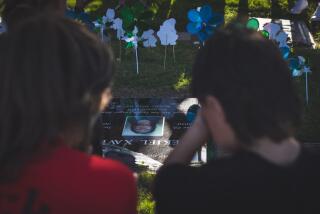Baby’s Death Spotlights a Rarity : Parenting: A father accidentally suffocated his 2-month-old in February as they slept. ‘Family bed’ advocates dismiss such occurrences as extremely unlikely, but others say any risk is unacceptable.
- Share via
COSTA MESA — The accidental suffocation of a 2-month-old infant by her father Feb. 20 has briefly spotlighted an extremely rare cause of death known as “paternal overlay.”
Only one other Orange County infant has been accidentally smothered by a sleeping adult in the past 10 years, according to the Orange County coroner’s office. Most such incidents involve the father, who typically weighs more than the mother.
Because such deaths are so rare, state and national authorities do not separate statistics on overlay deaths from other types of accidental infant suffocations.
In fact, some experts believe it is nearly impossible for an adult to suffocate a sleeping infant unless the adult is intoxicated.
“For 25 years, I have worked with parents who sleep with their infants on a constant basis and only one time have I heard of the practice resulting in overlay,” said Chele Marmet, director of the Lactation Institute in Encino. “These accidental cases are definitely rare.”
In each Orange County case, the fathers wwere arrested on suspicion of involuntary manslaughter but later freed after being interviewed by police and given alcohol and drug tests whose results were negative.
In the most recent case, police and coroner’s officials in Costa Mesa ruled that Jamie Uribe, father of Patricia Lorena Uribe, had accidentally suffocated his daughter.
In the previous, 1989, case, the Orange County district attorney’s office decided not to prosecute James B. Corbett III of Newport Beach, whose 6-week-old daughter, Tyra Corbett, suffocated. The death was ruled an accident after prosecutors interviewed Newport Beach police and county coroner’s officials.
Groups that advocate parents’ allowing infants and small children to sleep with them cite what they see as numerous benefits to the arrangement, among them the chance to develop a bond with the child and having the child in close proximity during the night for breast-feeding. The groups suggest that the risk of accidental suffocation is so small that parents who enjoy the practice need not worry.
“Because many fathers are often too busy to spend time during the day with their newborns, we encourage them to sleep with the infant to bring about a level of familiarity,” Marmet said. “I find it very unusual for an overlay to occur because a healthy baby will move if there’s a weight on top of them and a parent will respond.”
But a 1991 alert issued by the U.S. Consumer Product Safety Commission warns parents of the practice. “Infants 12 months or younger can suffocate while sleeping when they become wedged against adult and mattress,” the alert says.
Between 1985 and 1990, the commission said it had received reports of more than 250 infants having been suffocated on adult or youth beds when they became trapped between a mattress and a frame or wall. The commission did not categorize the types of suffocation, although it did attribute some of the deaths to parent overlays.
“When it comes down to it, the closeness that comes from sleeping with an infant does not outweigh the risk of suffocation,” said Mary Marlin, a registered nurse at Children’s Hospital of Orange County.
Marlin, who serves as a community liaison instructing parents throughout the county on infant care and other children’s health matters, said that most infants breathe solely through their noses until they are 4 to 6 months old, making suffocation more likely in an adult bed.
Family psychologist Dominic Bronell of Costa Mesa said having a father sleep alongside a child may not be the best way to develop familiarity between the two because there is little interaction when both are asleep.
“It’s obviously beneficial for the father to develop cohesion with the infant, but I don’t think that sleeping with the child is the best way,” said Bronell, who specializes in post-traumatic syndromes.
More to Read
Sign up for Essential California
The most important California stories and recommendations in your inbox every morning.
You may occasionally receive promotional content from the Los Angeles Times.













